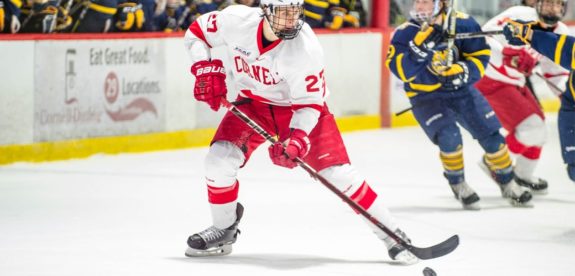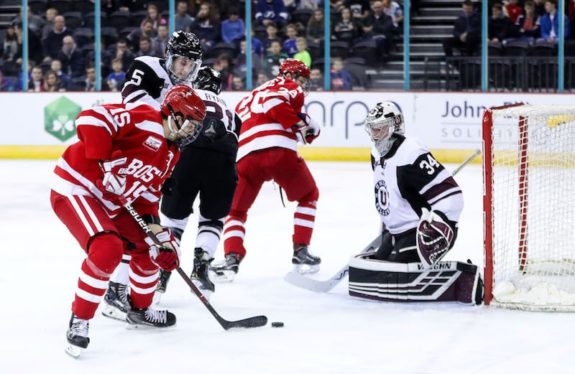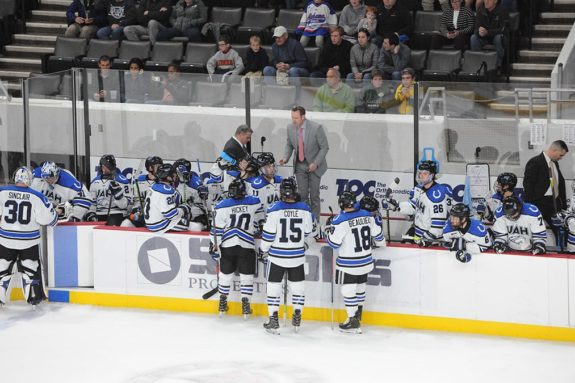After a long-extended wait, college hockey is set to take the ice this weekend. Each conference is starting on their own terms, with the exception of a few teams. On Thursday, the Ivy League made the announcement that they are canceling all winter sports for the 2020-21 season. This includes the six schools that are members of the Eastern Collegiate Athletic Conference (ECAC). This means all of the men’s and women’s hockey programs will not be competing this season.
In brighter news, the Alabama-Huntsville hockey program, which seemed to be on the chopping block back in the spring, has seemed to have found a plan for the future to keep the program around for a while.
The Ivy League Cancels Winter Sports
Why Now?
Over the past month, five of the six conferences at the NCAA DI level have announced their plans to return to play. The only conference that has yet to release their plans has been the ECAC. There was plenty of speculation that the conference was close to putting out their schedule, but as we have learned, they were waiting to see what the Ivy League was going to do.
The Ivy League was one of the first conferences to make it clear they were not going to have fall sports in 2020. This put the fate of the hockey teams at Brown University, Cornell University, Dartmouth College, Harvard University, Princeton University and Yale University in possible doubt.

Obviously, with rising coronavirus numbers across the country, concerns about the health and safety of the student-athletes and staff was at the forefront of the Ivy League’s decision. While other conferences have made plans to do the best they can to return to play, while maintaining a safe environment for teams, the Ivy League figured it was not worth the risk to have schools travel during these crazy times.
The strange part to the Ivy League not allowing hockey this upcoming season, is that a similar issue presented itself when the Liberty League, an NCAA DIII conference, announced Monday that they were going to cancel their winter sports season.
In contrast to the Ivy League, three of the five schools from that conference that have DI hockey, Clarkson University, RPI, and St. Lawrence University, decided to commit to playing this season. RIT, the lone member from the Liberty League that competes in the Atlantic Hockey Association (AHA), decided that they were going to follow suit with their respective conference, and not allow hockey to play this upcoming season. Update 11/17/2020: RIT will reconsider its decision to cancel hockey for the upcoming season.
What Now for the ECAC?
With half of the league out of action, only Clarkson, Colgate University, Quinnipiac College, RPI, St. Lawrence and Union remain. A positive side to having the small conference during the pandemic, similar to the Big Ten, is less traveling. With only six teams, they also do not have to worry about splitting the conference to limit contact as the National Collegiate Hockey Conference (NCHC) and Atlantic Hockey Association (AHA) have done.

The average schedule is looking to be around the mid-20s range for games. However, unless the ECAC can quickly put a schedule together by early December, the league may not be starting until January. Meaning that each team may only be looking at a 20-game schedule, if they want to crown a conference champ in March, that is.
It truly is a big blow to lose the six Ivy League teams this season, especially Cornell. The Big Red were the No. 1 team in the NCAA, and a favourite to make it to the Frozen Four.
Alabama-Huntsville Buys in For a Decade
Of all of the chaos that has been 2020, no other program has experienced the highs and lows like the University of Alabama-Huntsville hockey program has.
In May, the Chargers hockey program was cut, along with other programs at the university, citing budget issues caused by the pandemic. For most around the country, it came as no surprise. The Chargers had one of the most expensive travel budgets in the NCAA, and their lack of success over the years had not helped their cause.
However, supporters, alumni and boosters banded together to try and help save the team. With the help of former players and a long list of donations from many reputable folks from around the sport, enough money was raised to bring the team back, for at least the 2020-21 season.
Now, there is a plan in place to continue to have college hockey in Alabama for years to come. A network of donors and alumni was put together to raise money for the program, and, as of Wednesday, $17 million was raised. The group that spear-headed the effort was the hockey advisory board that came to fruition following the program being saved last spring.
The two men leading the group were members of UAH’s 1996 DII National Championship team, Taso Sofikitis and Sheldon Wolitski.
“This is not a band-aid,” Sofikitis told the media on Wednesday. “This is here long-term.”
The $17 million is meant to be used over the next decade for simple day-to-day operations, and shows that the program is here to stay. Hopefully, this gives the Chargers an opportunity to be aligned with a major conference following the dissolution of the Western Collegiate Hockey Association (WCHA) at the conclusion of the upcoming season.
“We need to get a conference,” UAH alum and Minnesota Wild netminder Cam Talbot stated on Wednesday. “It might be a little bit easier now since we’ve got the money, we’ve got the backing, we’ve got the support from the university, the alumni and everybody.”

There are also plans from the advisory board to push to build a multi-purpose facility on-campus that will be the new home of the Chargers’ hockey team. No further details have been announced at this time.
Just six months ago, it looked like college hockey in the south was going to be no more. Today, it looks to be alive and well. With the addition of a spirited list of alumni and boosters, that will be the case for the foreseeable future.